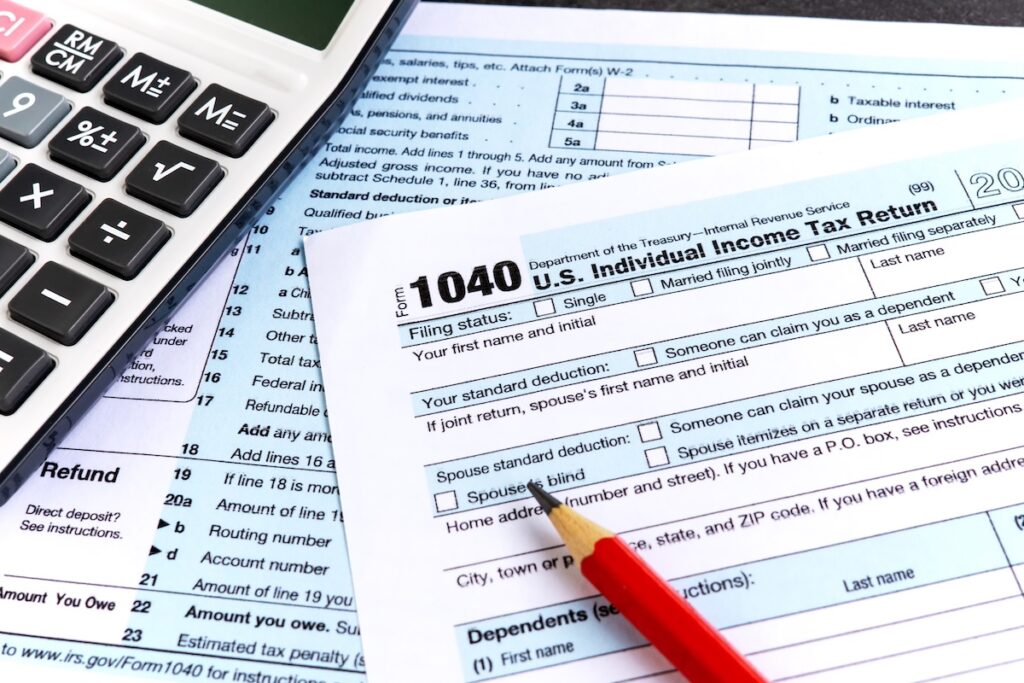Thailand Digital Nomad Visa: A Guide for American Remote Workers
July 24, 2025 | Digital Nomad, Featured | 7 minute read
Expat Tax Blog. Tax Tips for US Americans abroad.
Updated October 16, 2025
 All blogs are verified by Enrolled Agents and CPAs
All blogs are verified by Enrolled Agents and CPAs
Updated October 16, 2025

Thailand, often called the Land of Smiles, has attracted remote workers from around the world—long before “digital nomad” became a buzzword. Its affordability, friendly culture, and seamless blend of modern connectivity and tropical living continue to make it a top choice for location-independent professionals.
However, until now, most digital nomads relied on tourist visas, and many overstayed the limits. That changed in 2024 with the launch of Thailand’s digital nomad visa called the Destination Thailand Visa (DTV). The program offers a five-year option designed specifically for remote workers, freelancers, and entrepreneurs.
In this article, we’ll break down what the new visa offers, who qualifies, and what American digital nomads need to consider when it comes to taxes, residency, and long-term planning.
• Visa Length: 5 years (180-day stays, renewable annually)
• Proof of Funds: 500,000 THB (~$14,400 USD)
• Remote Work Only: Freelancers, remote employees, or business owners
• Tax Tip: Thailand does not tax foreign income as long as the money is remitted in a later tax year after it was earned.
• Family Friendly: Spouses and dependents can apply separately
What is Thailand’s Digital Nomad Visa
With the global rise of remote work and more countries introducing long-stay visas for digital nomads, Thailand has followed suit with a program of its own. The Destination Thailand Visa (DTV), launched in 2024, offers a five-year, multiple-entry option tailored to location-independent professionals. It allows stays of up to 180 days per entry, with the option to extend once per year, making it one of the more flexible long-term visa options in the region.
Thailand Digital Nomad Visa Requirements
The Destination Thailand Visa (DTV) is built for remote professionals who want to live in Thailand without jumping through tourist visa hoops. To qualify, applicants must meet several baseline criteria:
- Age 20 or older: The DTV is geared toward working adults, not students or short-term travelers.
- Remote income source: Whether you’re a freelancer, business owner, or employed by a non-Thai company, you’ll need to prove that your work is based outside Thailand.
- Financial stability: Applicants should have at least 500,000 THB (approximately $15,000 USD) in savings or steady income that shows you can support yourself while living in Thailand.
- No local employment plans: This visa doesn’t permit you to work for a Thai company. It’s strictly for remote, international work.
- Family eligibility: Spouses and dependents can apply for their own DTVs, provided they meet similar criteria and submit separate applications.
This visa aims to make long-term living in Thailand easier for digital nomads, without bending the rules.
How to Apply for the Thailand Digital Nomad Visa (DTV)
Applying for the Destination Thailand Visa (DTV) involves more than filling out a form, but the process is clear and straightforward if you’re prepared. Here’s how to move through it step by step.
Step 1: Make Sure You Qualify
Before starting your application, confirm you meet the key requirements:
- You’re at least 20 years old
- You work remotely as a freelancer, entrepreneur, or employee of a non-Thai company
- You can show proof of financial stability (500,000 THB in savings or steady foreign income)
- You carry valid health insurance
- You’re not seeking employment with a Thai business
If you meet these conditions, you’re a strong candidate.
Step 2: Prepare Your Documents
Gather all required documents in advance. This typically includes:
- A valid passport (with at least six months remaining and two blank pages)
- Proof of financial means (bank statements showing a minimum balance)
- Documentation of remote work or business activity such as employment contracts, freelance agreements, or portfolio items
- Health insurance policy covering your stay in Thailand
- A recent passport-style photo
- Optional but helpful: proof of address or accommodation in Thailand
Make sure all documents are up-to-date and professionally presented.
Step 3: Submit Your Application
You can apply through one of two channels:
- Online, using Thailand’s official e-visa system
- In person, at a Thai embassy or consulate in your country of residence
Double-check the instructions specific to your consulate, as requirements may vary slightly depending on location.
Step 4: Follow Up and Monitor Progress
Some applicants may be asked to provide additional documentation, attend an interview, or submit biometric data. If this applies to you, follow the instructions carefully and respond promptly to any requests from Thai authorities.
Step 5: Receive Your Visa and Plan Your Entry
Processing times typically range from 2 to 6 weeks, depending on the application channel and volume. Once approved, you’ll receive your visa with a 180-day stay. You can enter Thailand immediately and enjoy the full benefits of multi-entry access and optional extensions.
• Apply several weeks before your intended departure date
• Ensure income and employment documents are clear and consistent
• Keep both digital and printed copies of your full application
• Monitor communications from the embassy or e-visa platform for updates or additional requests
Pros of Thailand’s Digital Nomad Visa
The Destination Thailand Visa (DTV) is more than permission to stay, it’s a framework for building a stable, remote-friendly life in Thailand. For digital nomads, it solves common friction points while opening the door to deeper local access.
- Work remotely with peace of mind: No need to rely on tourist visas or overstays. The DTV provides a legal foundation for earning income from abroad while living in Thailand.
- Stay longer, leave when needed: The five-year visa allows stays of up to 180 days per entry, with an annual extension option. Multiple entries mean you can leave and return without losing time or starting over.
- Use local services like a resident: From banking to healthcare, the DTV gives you access to key services often off-limits to short-term visitors.
- Affordability without compromise: Thailand combines a relatively low cost of living with modern infrastructure, international schools, and high-quality amenities—especially appealing for those earning in stronger currencies.
- Lifestyle beyond the screen: Remote work may bring you to Thailand, but its regional diversity, wellness culture, and creative communities are what make people stay.
The DTV supports more than just remote work. Enrolling in Thai language classes, cooking courses, or wellness programs can strengthen your visa profile and connect you to the local community.
Digital Nomad Taxes for Americans in Thailand
The ability to stay in Thailand long-term under the DTV is a major win for remote workers, but it comes with potential tax tradeoffs. For American citizens, remember US tax responsibilities follow you no matter where you live.
Thai Tax Residency
If you spend fewer than 180 days in Thailand during a calendar year, you’re considered a non-resident, and you likely won’t owe Thai tax on foreign income.
Once you hit 180 days or more, you may become a Thai tax resident. That means foreign income remitted into Thailand during the same year it’s earned may be taxed. However, if you delay transferring that income until the following year, it may be exempt under current Thai rules. Therefore, it’s advised to keep documentation (e.g., bank statements, payslips, contracts) proving when and where the income was earned.
Thailand’s personal income tax rates are progressive, ranging from 0% to 35% depending on how much you earn.
US Tax Rules Still Apply
Even if you avoid Thai tax, the US taxes all citizens on worldwide income, no matter where you live. If you’re an American digital nomad, you must still file annually with the IRS.
That said, you may qualify for tax relief through two key provisions. The Foreign Earned Income Exclusion (FEIE) allows you to exclude up to $126,500 of foreign earned income from US taxes in 2024. Alternatively, the Foreign Tax Credit (FTC) offers a dollar-for-dollar credit on income taxes you’ve paid to a foreign government. Both can significantly reduce your US tax bill, but only if you file correctly.
Many US expats may also be required to report foreign bank accounts and assets by filing FBAR (FinCEN 114) and FATCA (Form 8938), depending on account balances and asset thresholds.
Self-Employment Tax
Many digital nomads are self-employed. If you’re a freelancer, contractor, or business owner, you’re responsible for US self-employment (SE) tax, even while living abroad. This tax covers Social Security and Medicare and is 15.3% of your net earnings.
FEIE and the Foreign Tax Credit help reduce income tax, but they don’t eliminate self-employment tax. This is a common surprise for expats who are earning independently overseas.
For more details, check out this full guide on digital nomad taxes for US expats.
Planning a move abroad or another major life change? Let MyExpatPlanning help you make smart decisions now, so next year’s taxes are fully optimized. From unlocking key expat tax benefits to properly reporting foreign accounts, we’ll guide you through every US tax detail that matters abroad. Proper planning isn’t optional—it’s what saves you in the long run.
How Does Thailand’s Digital Nomad Visa Stack Up Against Other Popular Programs?
Thailand’s Destination Thailand Visa (DTV) offers real advantages, but how does it measure up to other popular digital nomad visa programs?
| Country | Visa Name | Length | Income Requirement | Tax Implications |
|---|---|---|---|---|
| Thailand | Destination Thailand Visa (DTV) | 5 years (180-day stays) | 500,000 THB bank balance (approx. $14,400 USD) | Foreign income taxed if remitted into Thailand during the same year |
| Italy | Digital Nomad Visa | 1 year (renewable) | Approx. €28,000 annual income | Taxed as resident if staying more than 183 days |
| Portugal | D8 Visa Digital Nomad Visa | Temporary Stay Visa: Up to 1 year residency Visa: 2 years (renewable) | 4x Portuguese minimum wage, approx. €3,280/month | Subject to Portuguese tax laws |
| Costa Rica | Digital Nomad Visa | 1 year | $3,000/month (guaranteed for 24 months) | Foreign income is tax-exempt under the digital nomad visa (Law 10008) |
| Spain | Digital Nomad Visa | 1 year, renew up to 3 | €2,762 per month/month (200% of Spanish minimum wage) | 24% flat tax under Beckham Law |
Initial Setup Tips for Digital Nomads in Thailand
Settling into Thailand? These essentials will help you hit the ground running:
- Start flexible: Book a short-term rental via Airbnb or local Facebook groups while you scout neighborhoods in person.
- Stay connected: Get a prepaid SIM card from AIS, DTAC, or TrueMove to access high-speed mobile data from day one.
- Bank smarter: Opening a Thai bank account can make local payments easier. Some expats use Bangkok Bank or SCB (Siam Commercial Bank) or opt for fintech alternatives like Wise.
- Get around easily: Ride-hailing apps like Grab and Bolt cover most cities. Motorbike rentals are common in smaller towns, but make sure you have an international license and insurance.
- Know local etiquette: Take off your shoes before entering homes or some shops, and dress modestly when visiting temples.
- Plug into the expat network: Coworking spaces, language exchanges, and meetup groups in Chiang Mai, Bangkok, and beyond make it easy to find community fast.
Ready to Make Thailand Your Remote Work Base?
Thailand’s digital nomad Visa offers more than just sunshine and Wi-Fi, it’s a real opportunity for digital nomads to live and work legally in one of the most dynamic countries in Southeast Asia. With low living costs, strong expat infrastructure, and flexible visa terms, the DTV is a smart move for those seeking long-term stability without sacrificing lifestyle.
But settling in comes with responsibilities, especially when it comes to US taxes. That’s where MyExpatTaxes comes in. From FBAR and FATCA to the Foreign Earned Income Exclusion, we make sure your move abroad doesn’t come with tax surprises, and help you claim key tax benefits you’re entitled to.
Frequently Asked Questions
Content of the Accordion Panel
Yes. The United States taxes all of its citizens and green card holders on their worldwide income, regardless of where they live. However, you may be able to reduce or eliminate your US tax liability using provisions like the Foreign Earned Income Exclusion (FEIE) and the Foreign Tax Credit (FTC)
Content of the Accordion Panel
The visa fee is 10,000 THB (around $284 USD). Additional costs may include health insurance, document translations, and optional legal support.
Content of the Accordion Panel
Popular choices include Chiang Mai (affordable, quiet), Bangkok (cosmopolitan, great coworking), and Phuket or Koh Phangan for a beach-based lifestyle.
Content of the Accordion Panel
Yes, comprehensive health insurance is required. Costs typically range from $300 to $1,500 USD per year, depending on your age and coverage level.
Content of the Accordion Panel
Yes. Spouses and dependents can apply for their own DTVs if they meet similar requirements and apply separately.
Content of the Accordion Panel
No. The DTV is for remote work only and doesn’t lead to Thai permanent residency or local employment eligibility.
Content of the Accordion Panel
Possibly. If your documents aren’t in Thai or English, certified translation and notarization may be required, costing roughly $50 to $200 USD.
Content of the Accordion Panel
It’s optional, but some applicants choose to work with legal or visa consultants especially when applying from abroad. Fees range from $500 to $1,500 USD.
Content of the Accordion Panel
Yes. You can apply from many locations in Southeast Asia or beyond, as long as your nationality is on Thailand’s approved list. Be sure to check with the local Thai embassy or consulate in your current country for specific requirements.
See Why US Expats From Around the World Love Us!
Easily file regardless of how complex your US expat tax situation is.
Been here before? Sign in!


Written by Nathalie Goldstein, EA
Nathalie Goldstein, EA is a leading expert on US taxes for Americans living abroad and CEO and Co-Founder of MyExpatTaxes. She contributes to Forbes and has been featured in Forbes, CNBC and Yahoo Finance discussing US expat tax.
July 24, 2025 | Digital Nomad, Featured | 7 minute read






